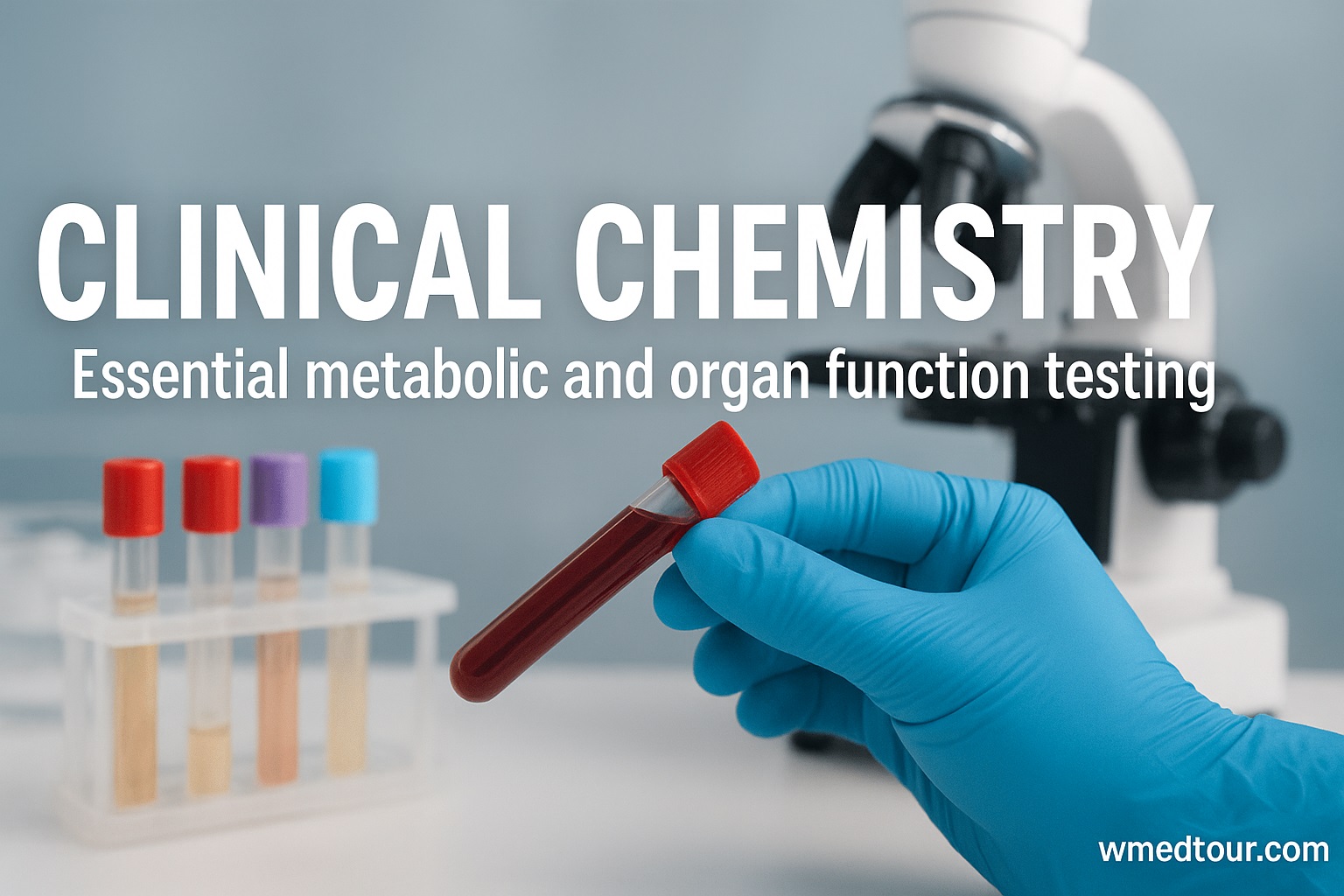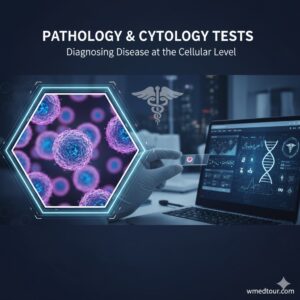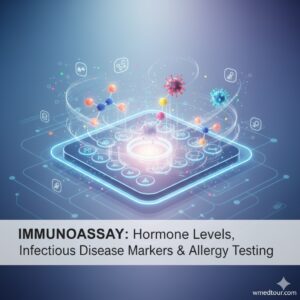Description
🔬 Clinical Chemistry: Essential Metabolic and Organ Function Testing & 2025 Trends ✨
Executive Summary: Your Health Decoded
Clinical chemistry is the indispensable pillar of modern diagnostics, providing the crucial data needed to assess your body’s metabolic and organ function. This authoritative yet easy-to-understand guide breaks down how these essential tests work and highlights the cutting-edge advancements, like AI and next-gen analyzers, that are revolutionizing patient care in 2025.
- Pillar of Diagnostics: Clinical chemistry analyzes body fluids (blood, urine) for key markers like glucose, creatinine, and enzymes to monitor organ health.
- 2025 Innovation: Automation and Artificial Intelligence (AI) are the top trends, leading to faster, more accurate, and personalized diagnostic insights.
- Why it Matters: These tests are vital for early detection, therapeutic drug monitoring, and guiding precision treatment plans, ensuring you receive the most effective care.
The Foundation of Wellness: What is Clinical Chemistry?
Clinical chemistry, sometimes called clinical biochemistry or chemical pathology, represents a vital branch of laboratory medicine. It focuses on measuring and analyzing the chemical components—or analytes—found in biological fluids such as blood, urine, and cerebrospinal fluid. We rely on this data to gain deep insights into your overall health. Essentially, Clinical Chemistry: Essential metabolic and organ function testing acts as your body’s internal report card, revealing how well your organs function and if your metabolism is running efficiently. Consequently, physicians depend on these results for over 70% of all clinical decisions.
The field has evolved significantly from rudimentary colorimetric tests to today’s highly automated systems. Because of this progress, we can now detect subtle shifts in biochemical patterns, often long before physical symptoms even manifest. This early warning system is paramount for preventive healthcare. To start your journey toward proactive health, consider a Full Body Check-up abroad.
The Power of Clinical Chemistry Tests for Organ Health 🩺
Routine lab work often involves panels of tests that target specific organ systems. Understanding these panels helps you and your physician proactively manage health. For example, a Comprehensive Metabolic Panel (CMP) is a foundational example of Clinical Chemistry: Essential metabolic and organ function testing in action.
Kidney Function Markers
The kidneys filter waste from your blood, a process we monitor through key analytes. Therefore, measuring blood urea nitrogen (BUN) and creatinine provides a clear view of renal performance. Moreover, abnormal levels often signal potential kidney stress or disease. For those considering procedures like a Kidney Transplantation, pre-operative chemistry is non-negotiable.
- Key Analytes: Creatinine, Urea (BUN), Electrolytes.
- Clinical Insight: Essential for diagnosing kidney disease and monitoring treatment efficacy. If you are exploring options for stone removal, understanding your renal function is the first step, as detailed in our guide: Compare Kidney Stone Surgery: Best Countries 2025.
Liver Function Tests (LFTs)
The liver is your body’s major chemical factory. Liver function is assessed by measuring enzymes (like ALT and AST) that spill into the bloodstream when liver cells are damaged, and by analyzing bilirubin, which the liver processes. These tests are critical components of comprehensive checkups, which you can learn more about here: Health Checkup 2025: Preventive Care.
Metabolic & Endocrine Markers
Glucose testing is perhaps the most frequent example of metabolic function analysis. High glucose levels may indicate diabetes or pre-diabetes, and precise monitoring is crucial for treatment optimization. Furthermore, the precision of Clinical Chemistry: Essential metabolic and organ function testing is vital for all chronic disease management.
- Key Analytes: Glucose, HbA1c, Cholesterol (Lipid Profile), Thyroid Hormones.
- Clinical Insight: Uncontrolled metabolic issues affect every system. We discuss the importance of managing these conditions, including diabetes treatments available through medical travel, in our Understanding Diabetes Symptoms and Treatments guide.
Analyzing Key Health Indicators: Cardiovascular & Precision Testing
Beyond the basics, advanced Clinical Chemistry: Essential metabolic and organ function testing allows for highly targeted diagnostics, particularly in cardiology. This evolution drives the push toward preventative care and precision medicine.
Cardiovascular and Lipid Profile Diagnostics
Early detection of heart disease risk relies heavily on the lipid profile—measurements of total cholesterol, HDL, LDL, and triglycerides. More recently, advanced markers are gaining prominence.
Comparison Table: Traditional vs. Advanced Cardiac Markers
| Marker Type | Example Test | Pros (Advantage) | Cons (Limitation) |
|---|---|---|---|
| Traditional | Troponin I (Post-Event) | High specificity for myocardial damage; widely available and affordable. | Detects injury *after* the event; less useful for long-term risk prediction. |
| Advanced/Future | Lp(a) and High-Sensitivity CRP | Detects genetic/chronic inflammation risk; helps tailor preemptive treatment plans. | Higher cost; not yet universally ordered in all routine panels. |
This evolving precision aids physicians, especially when planning specialized procedures like Coronary Artery Bypass Grafting (CABG) or those covered in our Cardiac Surgery and Ablation Guide.
A Diagnostic Journey: How Clinical Chemistry Saved a Patient 💡
Let’s consider “Mr. Kemal,” a 55-year-old businessman in Istanbul who experienced unexplained fatigue and nausea. His local primary care physician, working with a CAP-aligned laboratory, ordered core Clinical Chemistry: Essential metabolic and organ function testing—a perfect use case for rapid, reliable diagnostics.
- Initial Finding: The routine CMP revealed significantly elevated liver enzymes (ALT, AST) and moderately high creatinine, flagging a dual concern for both liver and kidney stress.
- The Diagnosis: Based on the precise data from the clinical chemistry lab, the physician moved rapidly to targeted imaging. The results confirmed a severe, non-alcoholic fatty liver condition that was beginning to compromise renal function.
- The Outcome: Thanks to the speed and accuracy of the diagnostic testing, Mr. Kemal received immediate dietary and medication intervention. His physician used the subsequent serial chemistry reports to monitor his therapeutic progress, avoiding a potentially irreversible health crisis. This case underscores why international patients seek high-quality diagnostics in destinations with robust regulations, which we detail in our Complete Legal Medical Travel Guide for Turkey.
The Future is Automated: Clinical Chemistry Trends in 2025 🚀
The field of Clinical Chemistry: Essential metabolic and organ function testing is currently being revolutionized by digital advancements. The trends for 2025 center on efficiency, precision, and integration. Automation and Artificial Intelligence (AI) are dominating laboratory trends this year, driven by the need to handle increased workloads and improve patient outcomes.
AI, Automation, and Precision Medicine
Automated systems now handle the entire workflow, from sample handling to analysis and result reporting, significantly reducing human error and improving Turnaround Time (TAT). Furthermore, AI algorithms are processing the vast datasets generated by these analyzers, identifying subtle patterns that human analysts might miss. This technology will soon be suggesting reflex testing and assisting in the development of hyper-personalized treatments—a true step forward for precision medicine, crucial in complex fields like Cancer Treatment with AI and CAR T.
We believe connecting with expert professionals is key. You can find accredited medical professionals who rely on these high-tech diagnostics in our Doctors directory.
Pros and Cons of Next-Generation Clinical Chemistry
- Pros: Automation ensures remarkable consistency and speed. AI integration boosts diagnostic accuracy and allows for proactive predictive modeling. The move towards precision diagnostics, including proteomics and metabolomics, is tailoring medicine to the individual patient’s unique biological profile.
- Cons: However, high capital cost for advanced instruments can limit access in some facilities. Relying on complex software and IoMT (Internet of Medical Things) demands stringent data security protocols and specialized IT support.
Final Verdict: Trust Your Clinical Chemistry Results
The analysis of blood and urine via clinical chemistry remains the cornerstone of all medical assessment, providing clear, actionable data on your kidneys, liver, heart, and metabolic balance. To clarify, the combination of foundational tests and modern, AI-powered systems ensures that patients worldwide, including those who travel for medical care, receive the highest level of diagnostic quality. This emphasis on diagnostics forms the core of our Checkup Department philosophy, helping you move from screening to personalized care with confidence. For patients considering medical travel, always check the lab’s accreditation, whether in Iran, Turkey, or any other destination.
Yoast SEO Suggestions
Suggest product name
WMedTour Comprehensive Metabolic Panel (CMP) + Advanced Cardiac Markers









Reviews
There are no reviews yet.